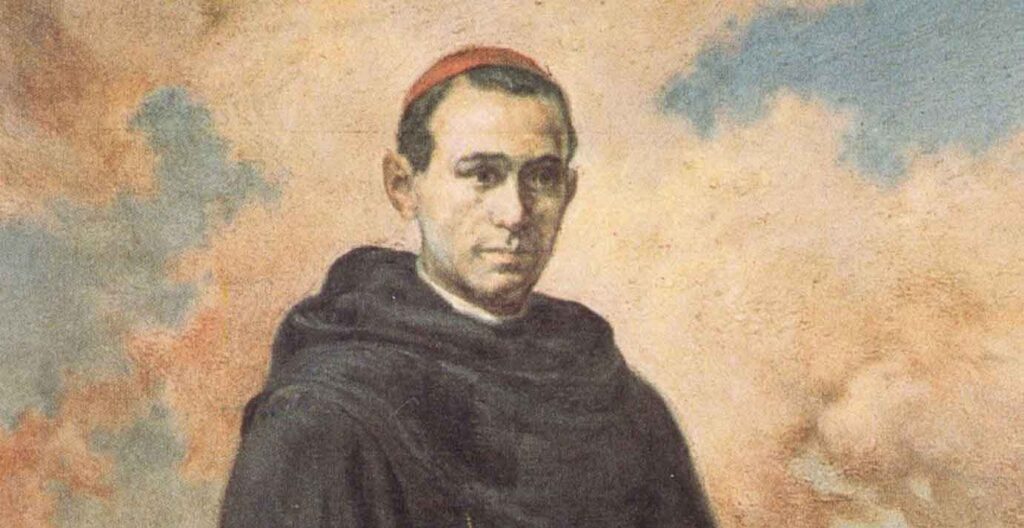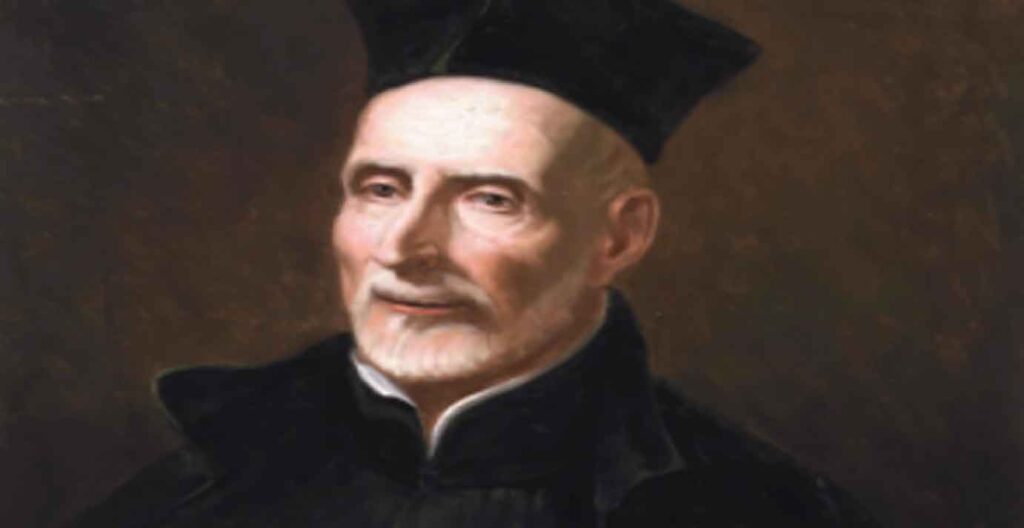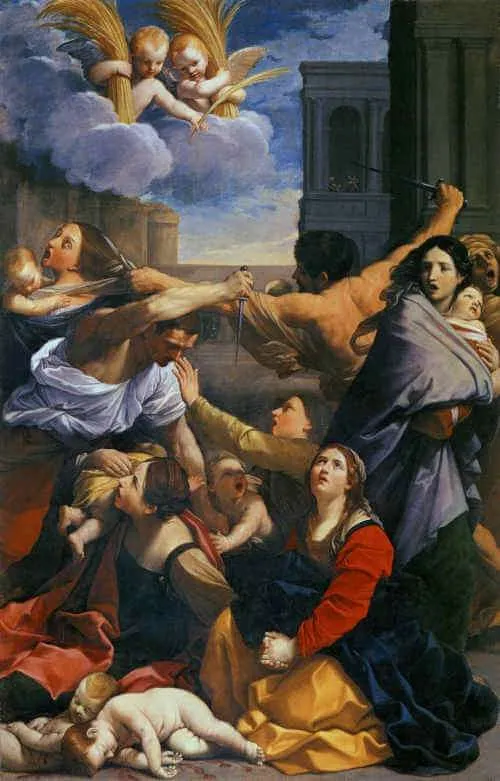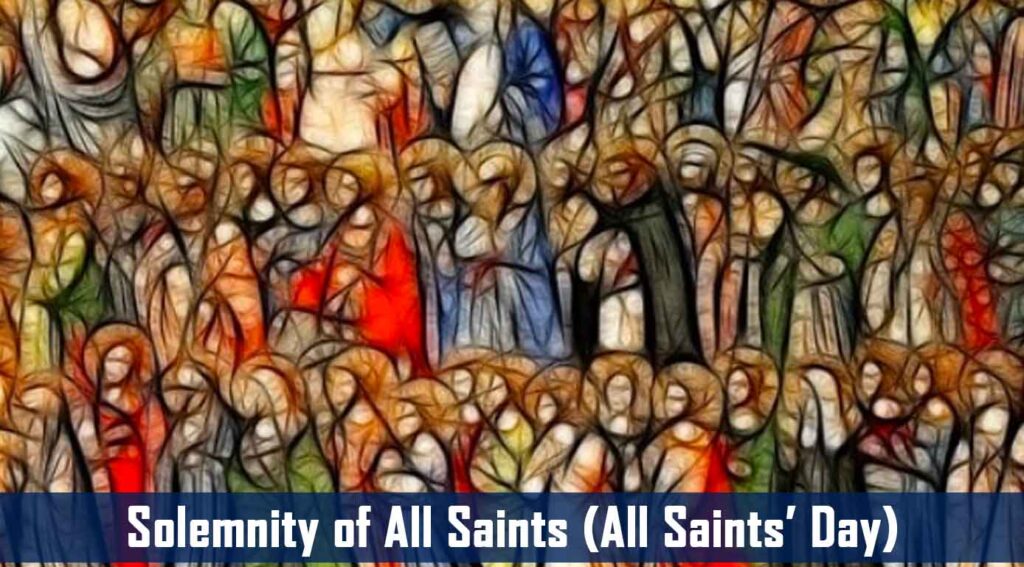c. 332–387; Patron Saint of homemakers, married women, mothers, abuse victims, alcoholics, and widows; Invoked against difficult marriages and difficult children; Pre-Congregation canonization
Saint Monica, whom we honor today, was the mother of one of the greatest saints in the history of the Church: Saint Augustine. Monica was most likely born in Thagaste, present-day Souk Ahras, Algeria, North Africa, and was a member of the Berber tribe, a diverse group of peoples indigenous to North Africa prior to the arrival of the Arabs. Thagaste was then part of the Roman Empire, which had legalized Christianity just twenty years before Monica was born. She was raised in a Christian home and became quite devout. Because Christianity was still new to the Roman Empire, Christians were likely a minority at that time. Monica married a man named Patricius (Patrick), who was a pagan and said to have had a violent temper and an immoral lifestyle. Patricius’ mother lived with the couple and is said to have had the same violent temperament as her son. Monica and Patricius had three children: sons Augustine and Navigius and a daughter whose name is unknown.
Monica’s marriage and home life were difficult, but she was a woman of deep faith and prayer. Earlier in her life she had struggled with alcohol but overcame those difficulties. Once married, her husband opposed her Christian faith and prayer life, but he also saw in her something that led to his respect for her. She wanted to baptize her children when they were born, but Patricius refused permission. His refusal broke her heart and led to her unwavering prayers for her family. When Augustine became ill as a child, Patricius initially agreed to permit his baptism, but when the boy recovered, Patricius once again forbade it.
Monica’s only recourse was prayer. She prayed fervently for her family’s conversion, and her prayers began to take hold. Patricius admired Monica’s virtues and was deeply affected by her love for him. That, coupled with her prayers, led to Patricius’ conversion and baptism around the year 370. He died one year later. Patricius’ mother also converted.
Augustine, her oldest child, was around sixteen when his father died. He had received a good education as a youth at a school about twenty miles south of their hometown. When Augustine was seventeen, he was sent to Carthage, in modern-day Tunisia, to study rhetoric. Though part of the Roman Empire at that time, Carthage had its roots in Greek culture and had some of the best schools where many prominent figures in society were educated. In Carthage, Augustine was searching for truth. After reading Cicero’s dialogue Hortensius, his thirst for truth grew stronger. Around this time, Augustine met a woman with whom he lived and had a child, despite his mother’s strong warnings against fornication.
In Carthage, Augustine was introduced to the teachings of Mani, a man who claimed to be the final prophet in a line of prophets such as Buddha, Zoroaster, and Jesus. Mani taught that there was a fundamental conflict between two opposite, co-eternal principles: light and darkness. Light was good; darkness was evil. He taught that the material world was a union of light and darkness, good and evil, and that the goal of human life was to release the light trapped within the darkness of the material world. Augustine embraced this religion, becoming a Manichaean. But there was one problem Augustine would face: his mother’s prayers and faith were powerful.
When Augustine returned from school in Carthage, he began to teach in his hometown. It was then that he announced he had become a Manichaean. As a result, Monica threw him out of her house as an act of the deepest love. God then spoke to her in a vision that gave her hope for her son, and she reconciled with him.
Augustine decided to open a school of Rhetoric, and he could think of no better place to do so than Rome. Around the age of thirty-one, he informed his mother that he was going to Rome. Because of her motherly concern for her son and because she had seen her two other children convert and be baptized, she informed Augustine she was going with him. However, before she knew it, Augustine sneaked away and traveled to Rome without her. She would not give up, so she followed. By the time she arrived in Rome, Augustine had already left and taken a prestigious teaching position in Milan. She followed him there.
Over the next four years in Milan, Monica never gave up, praying for her son through tears. Since Augustine was impressed with intellectuals, he was drawn to the Catholic Bishop of Milan and future Saint Ambrose. Bishop Ambrose was an answer to a mother’s prayers. Around the year 387, at the age of thirty-three, Augustine converted to Christianity and was baptized by Bishop Ambrose.
Once converted, Augustine and his mother decided to return home to Thagaste, but Monica would never complete the trip. She fell ill and died in Ostia, a city just outside of Rome. Augustine went on to become one of the most influential theologians in the history of the Church. In his book, Confessions, Saint Augustine shares the beautiful story of his mother. He highlights all that we know about her. He shares her early struggle with alcohol. When Augustine went astray at Carthage, he recalls how she wept for him more than most mothers would weep over the death of their child. Augustine recounts how fervently his mother prayed while they were in Milan and sought the counsel of Bishop Ambrose. Augustine’s most tender description of his mother describes his relationship with her after his conversion, their conversations, and her death. She had a profound impact upon him, and he, in turn, has had a profound impact upon the entire Church.
Saint Monica endured a difficult life, but she persevered, overcame her difficulties, and devoted herself to a life of prayer and virtuous living. Her prayers and virtues first won over her husband and mother-in-law, then all three of her children. Though Saint Augustine is the most well known, this mother, daughter-in-law, and wife made a difference in the lives of her entire family. Saint Monica is seen by many as a model of hope for those whose family members have gone astray. As we honor her today, ponder the power of her prayers. As you do, be reminded that your prayers for your family are also powerful. If you have someone in your family who has gone astray, allow Saint Monica to inspire you and devote yourself to praying for them, so that each member of your family will share, one day, the glories of Heaven with you.
Source: https://mycatholic.life/saints/saints-of-the-liturgical-year/st-monica-mother-of-st-augustine—august-27/








